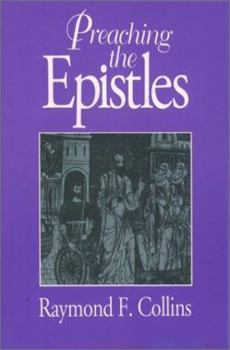Preaching the Epistles
Provides preachers with all the material they need to explain the epistles to others. This description may be from another edition of this product.
Format:Paperback
Language:English
ISBN:0809136252
ISBN13:9780809136254
Release Date:January 1995
Publisher:Paulist Press
Length:151 Pages
Weight:0.50 lbs.
Dimensions:0.5" x 5.3" x 7.9"
Customer Reviews
1 rating
Concrete Help For Homilies Based on the New Testament Letters
Published by Thriftbooks.com User , 18 years ago
The advent of the Lectionary in Catholic circles, and the common lectionary adopted by many Anglican communities and mainline Protestant churches has introduced Christians to a wider variety of scriptural writings. The Gospels are presented in three year cycles, each devoted to one of the synoptic Evangelists (Matthew, Mark, and Luke) with John's Gospel placed in thirds in each year. Appropriate readings from the Hebrew Scriptures are paired with the Gospel selections which invites congregations to reflect upon the older writings of scripture as a whole and then in light of the Gospel. The Epistles or letters, most of which were written by St. Paul but also includes the letters of James, Jude, Peter, John, and the Letter to the Hebrews are also divided into three year cycles. The common practice is to preach either on the Old Testament and Gospel passage, or the Epistle reading. Most people I know who preach (I'm included in this category) almost always look first to the Gospel and use it as the major source of homilies and sermons. It will more than likely be illustrated with the Hebrew Scripture reading, which could be the basis of an entire homily or sermon if it is engaging enough for listeners. The Letters or Epistles are only preached on when the Gospel and Old Testament readings are those which the preacher or homilist wants to avoid or can't say anything about that has not been said in the recent past weeks. Raymond Collins, a noted Catholic bible scholar and authority on the writings of St. Paul makes a case for preaching from the epistles from time to time. He notes the problems many homilists, at least Catholic homilists have when preaching on the epistles, especially those of St. Paul. The problems and challenges can include difficulties in understanding the letters themselves, the different culture of the days the letters were written and our own day and age (Paul's views of women's roles in Churches and married life quickly come to mind), the fact that many of the letters are the basis of what Catholics consider Protestant theology, and the fact that many of the letters are dense and not composed of the colorful stories that populate the Old Testament and Gospels. Collins acknowledges these concerns but does not accept them as legitimate reasons to ignore the epistles. Rather, he gives a brief explanation of these writings, suggests ways in which they can be updated and speak to people today. He looks at the three lectionary cycle sand offers suggestions as to how the epistles can be used in homilies. His book is not so much an exhaustive study as it is a strong argument about including these writings we often hear in church or come across when reading the Bible, but may not pay as much attention to as we should. This book was first released shortly before I began preaching, but I didn't realize its usefulness right away. I read it and agreed with what it had to say, but I wasn't convinced of its practical purpose until a few year




